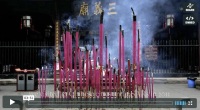NPR on the Chinese Charm offensive: broadcast and transmission parity to get its side of the story out first, traditional media style remains a priority for the Chinese.
“We see what the British have done; what CNN has done for years. We need to be part of that… China is a big power; the state broadcaster is a big company. We want to be part of that dynamic.” Jim Laurie, lead consultant for CCTV America when relating what Chinese executives told him.
– – –
China Seeks Soft Power Influence in U.S. Through CCTV
By David Folkenflik
Source – NPR, published April 25, 2013

Before joining CCTV America, Phillip T.K. Yin was an anchor and reporter for Bloomberg Television. Source – NPR
At a time when so many major American news organizations are cutting back, foreign news agencies are beefing up their presence abroad and in the U.S. One of the biggest new players arrives from China and, more likely than not, can be found on a television set near you.
CCTV, or China Central Television, is owned by the Chinese government. With more than 40 channels in China and an offshoot in the U.S., the broadcaster has been highly profitable for the country’s ruling Communist Party, which is liking profits a lot these days.
Navigating Two Media Traditions
CCTV America Business News Anchor Phillip T.K. Yin was born and raised in the U.S. by parents who emigrated from mainland China. Yin used to work in investment and for CNBC and Bloomberg. He says he is mindful of the tension between the American tradition of an independent press and Chinese expectations that the media serve the state. And yet, he says, CCTV America has broadcast interviews involving allegations of major computer hacking incidents originating in China — hardly a flattering story.
“It’s changing very quickly,” Yin says. “I can tell you even from the time that we came onboard here to where we are today, we’ve changed a lot. We’re covering stories from sometimes very controversial angles.”
CCTV America has its home in a new building just two blocks from the White House, in the heart of Washington, and it’s carried by cable providers in New York, Washington and Los Angeles, among other big cities.
Please click here to read the full article at its source.
Filed under: Beijing Consensus, Censorship, Charm Offensive, Chinese Model, Communications, Culture, Economics, Education, Entertainment, Finance, Government & Policy, Greater China, Ideology, Influence, Infrastructure, International Relations, Mapping Feelings, Media, Modernisation, Nationalism, NPR, Peaceful Development, Politics, Public Diplomacy, Soft Power, Strategy, Tao Guang Yang Hui (韬光养晦), Technology, The Chinese Identity, The construction of Chinese and Non-Chinese identities, U.S.










The Sharing Circle